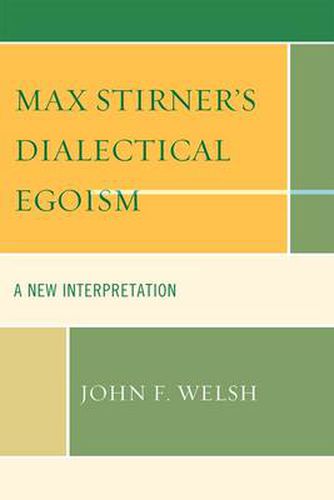Readings Newsletter
Become a Readings Member to make your shopping experience even easier.
Sign in or sign up for free!
You’re not far away from qualifying for FREE standard shipping within Australia
You’ve qualified for FREE standard shipping within Australia
The cart is loading…






Max Stirner (1806-1856) is recognized in the history of political thought because of his egoist classic The Ego and Its Own. Stirner was a student of Hegel, and a critic of the Young Hegelians and the emerging forms of socialist and communist thought in the 1840s. Max Stirner’s Dialectical Egoism: A New Interpretation examines Stirner’s thought as a critique of modernity, by which he meant the domination of culture and politics by humanist ideology. In Stirner’s view, humanity is the supreme being of modernity and humanism is the prevailing legitimation of social and political domination. Welsh traces Stirner’s thought from his early essays to The Ego and Its Own and Stirner’s responses to his critics. He also examines how Benjamin Tucker, James L. Walker, and Dora Marsden applied Stirner’s dialectical egoism to the analysis of (a) the transformations of capitalism, (b) culture, ethics, and mass psychology, and © feminism, socialism, and communism. All three viewed Stirner as a champion of individuality against the collectivizing and homogenizing forces of the modern world. Welsh also takes great care to dissociate Stirner’s thought from that of the other great egoist critic of modernity, Friedrich Nietzsche. He argues that the similarities in the dissidence of Stirner and Nietzsche are superficial. The book concludes with an interpretation of Stirner’s thought as a form of dialectical egoism that includes (a) a multi-tiered analysis of culture, society, and individuality; (b) the basic principles of Stirner’s view of the relationship between individuals and social organization; and © the forms of critique he employs. Stirner’s critique of modernity is a significant contribution to the growing literature on libertarianism, dialectical analysis, and post-modernism.
$9.00 standard shipping within Australia
FREE standard shipping within Australia for orders over $100.00
Express & International shipping calculated at checkout
Max Stirner (1806-1856) is recognized in the history of political thought because of his egoist classic The Ego and Its Own. Stirner was a student of Hegel, and a critic of the Young Hegelians and the emerging forms of socialist and communist thought in the 1840s. Max Stirner’s Dialectical Egoism: A New Interpretation examines Stirner’s thought as a critique of modernity, by which he meant the domination of culture and politics by humanist ideology. In Stirner’s view, humanity is the supreme being of modernity and humanism is the prevailing legitimation of social and political domination. Welsh traces Stirner’s thought from his early essays to The Ego and Its Own and Stirner’s responses to his critics. He also examines how Benjamin Tucker, James L. Walker, and Dora Marsden applied Stirner’s dialectical egoism to the analysis of (a) the transformations of capitalism, (b) culture, ethics, and mass psychology, and © feminism, socialism, and communism. All three viewed Stirner as a champion of individuality against the collectivizing and homogenizing forces of the modern world. Welsh also takes great care to dissociate Stirner’s thought from that of the other great egoist critic of modernity, Friedrich Nietzsche. He argues that the similarities in the dissidence of Stirner and Nietzsche are superficial. The book concludes with an interpretation of Stirner’s thought as a form of dialectical egoism that includes (a) a multi-tiered analysis of culture, society, and individuality; (b) the basic principles of Stirner’s view of the relationship between individuals and social organization; and © the forms of critique he employs. Stirner’s critique of modernity is a significant contribution to the growing literature on libertarianism, dialectical analysis, and post-modernism.